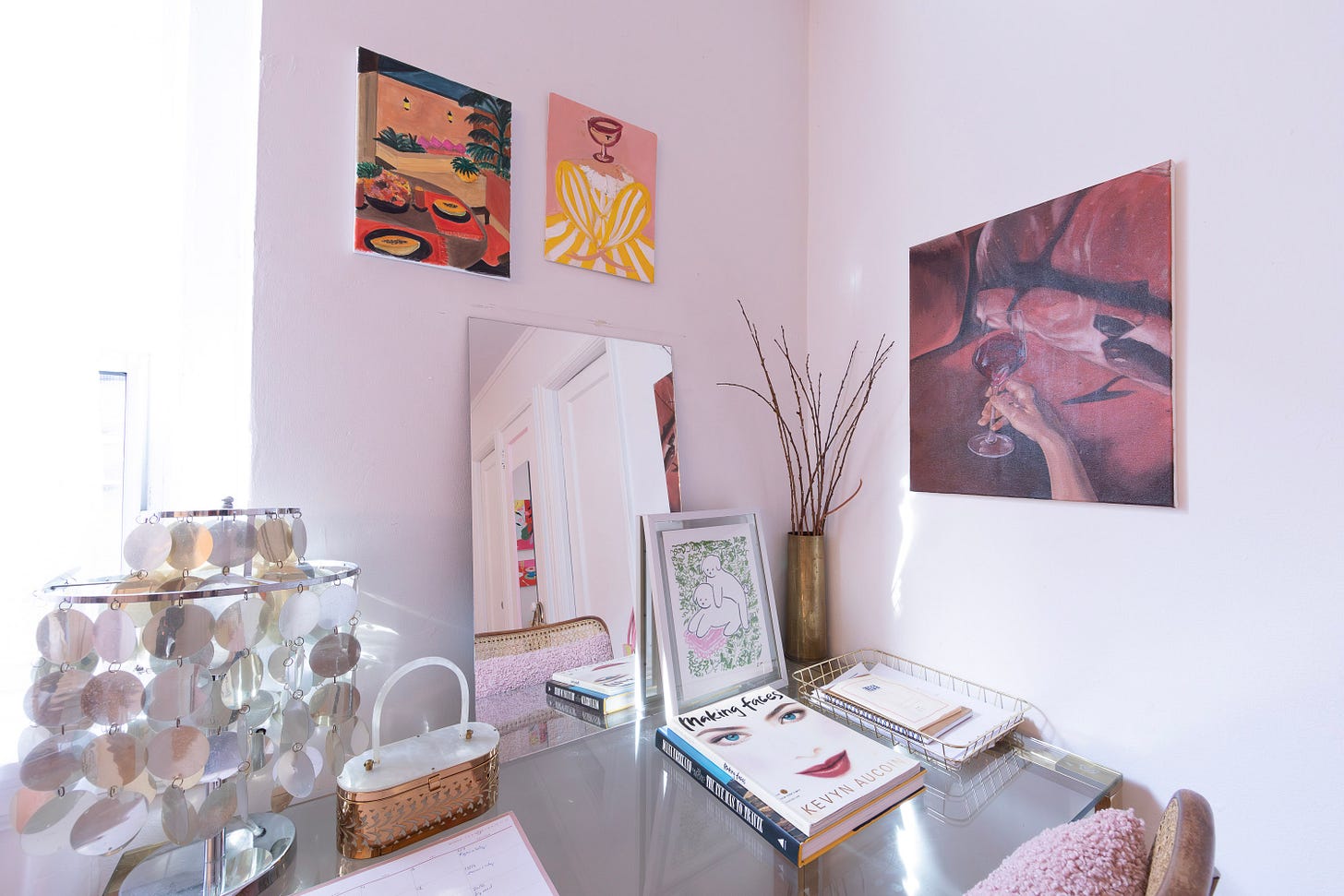“An Ode To…” is a category of essays where I write on things worth rhapsodizing. This category is for paid subscribers. Don’t want to miss essays like this one? Upgrade now.
When I was eighteen, I moved to London with a carry-on and a checked luggage. This was, in my mind, all I would need to start a life.
Over the next few years, the sparse number of items in my possession would make it easy to shift scenery at the drop of a hat. Sentimentality was confined to a small box of curios that acted as talismans from my past: a starfish from the Hamptons, a napkin from The Wolseley, pressed flowers from an old paramour.
I would move from one three-week sublet to a housesitting gig, and often, to an accommodating boy’s house. There were the apartments I’d share with friends for longer, but never on the lease. I was in that tricky situation of having no guarantor. It was true, there was no guarantee that I could afford anything. The flats in London were always cold, with their single-paned windows and a dampness trapped within the walls. I did not understand everyone’s reluctance about turning the heat on—it was expensive, sure, but I did not think warmth should be a luxury.
Most people I knew had parents helping them. I felt alone in that I did not. I would have trouble paying council tax—the borough charged each resident for the upkeep of their neighbourhoods. When I was late on a payment, they’d send letters saying they’d send a “bailiff” to collect. It seemed Dickensian. I tried to quell the anxiety of the letters by leaving the envelopes unopened, and even further, not looking at my bank balance at all. It was a guessing game, watching a card machine approve or decline my transaction. My mother was sick and then died a year into living in London. Reality hung by tightly wound strings that I was desperate to puppeteer. All I wished was to see each day through. Sausage rolls from the local Gregg’s and £3 ready meals from Tesco made up my diet when I was shuttling between class and nannying. Weekends were accounted for with the family meal served before service at the variety of restaurant jobs I’d work. After six years of living in London with stints in New York, I still had the carry-on, the checked luggage, plus three of those large plaid laundry bags; the kind you buy at the pound shop.
I loved the idea of running away. I wanted to be the one to leave, and not the one left. Espouse nothing, even grief. It was my answer to things unanswerable. But, as borders go, my time on the run was coming to an end. I would have to return home once my visa expired. Whatever emotional tumult I had cast off in my absence, was now eagerly waiting for my arrival home. Of course, I had arranged an exit plan out of Toronto—engaged to be married and (finally, legally) moving to New York. I convinced myself to believe in a temporary limbo—I promised I would only stay in Toronto for a year.
There was one thing that nagged at my conscience, surprising even myself. With the anticipated move, I feared I would never have the chance to live alone. That I would go from living with roommates to partners with no break in between. The possibility unsettled me. It was something of a rite of passage I should be able to complete as a young woman. Virginia Woolf rang in my head—money and a room of one’s own. Yes, I was a woman who wrote fiction, but a room of one’s own felt significant to me beyond artistic production. There was a certain freedom in privacy, coming and going without explanation. The thought of never knowing the idiosyncrasies of who I’d be living alone felt like a kind of loss.
There was a lesser, still pressing concern that I’d spent so many years developing my dress sense but never the space or money to know my décor. I wanted to surround myself with things I had solely chosen, things I’d deemed beautiful enough to be around every day. There were so many years I spent sleeping on someone’s strange mattress, or writing at someone else’s desk that it had always felt like I was stepping into someone’s shadow. The urge to live alone far outweighed any difficulties I’d encounter trying to achieve the feat. I still wanted to be Holly Golightly finding her alligator shoe in a fruit basket, or Jean Rhys’s Sasha Jensen in “rooms where I might be happy, rooms where I never shall be.” If anyone were to have a Single Girl’s Apartment, it would be me.
Many people will never live alone; it is just the way city-dwelling is. I realize now, my own mother had never lived alone. She had lived with my grandparents, briefly with my father, and then with me. My difficult, formative teenage years were spent with her in a small two-bedroom apartment in midtown Toronto. Regardless of her designation as a young, divorced mother, I can see she tried to make our home her own single girl apartment. Rows of her shoes lined the hallway, and the closets were bursting with spontaneous purchases she could not afford. We were twenty-two years apart, which manifested in both a kinship and rivalry—mothers so often have sharp tongues. Yet, she furnished her world with a vision of what her life could have been had she not had a child so young.
I’d now been in Toronto for six months, having initially looked for an apartment during the back-to-school rush and losing out to eighteen-year-olds cushioned by their parents’ credit scores. I sat on a tiny stool in the back stairwell of a 12-unit building with the landlord. All this time I’d been commuting from my grandparents’ house an hour and a half away in the suburbs of Scarborough. The landlord was a stern woman from Hong Kong who wore pink rainboots and a Louis Vuitton bag. I handed her a wad of cash for first and last. She sat on the bottom step counting it.
She looked at me with eyebrows raised, “How old are you?”
“Twenty-four.”
“You look eighteen.”
I gave a nervous laugh.
“Is working at a gallery like real estate? You only make money if you sell?”
Keep reading with a 7-day free trial
Subscribe to From the Desk of Marlowe Granados to keep reading this post and get 7 days of free access to the full post archives.





